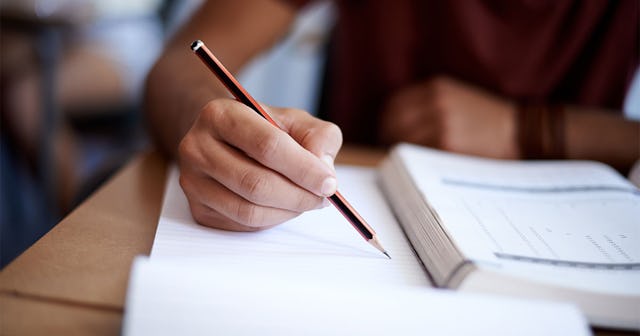The Case For Open-Book Tests And Exam Previews

When we think of studying for exams for high schoolers and college students, most people think of things like cramming during all-nighters, hoping they’re fitting all the answers into their brain. Some of us might even have flashbacks to our own horrible exam week experiences. We have horror stories about the times we spent spending hours, days, or weeks studying — only to realize that we’d studied for the wrong questions. And lord knows, we all had that one class where we could rattle off information left and right during class, but as soon as we sat in that tiny desk with our #2 pencil, everything we knew seemed to be erased from our brain.
But it doesn’t have to be this way.
A professor’s post recently gained some traction for its seemingly novel way of approaching test preparation – tell students the questions in advance.
“1-2 weeks before an exam, I give my students a list of possible essay and exam questions,” Kim Weeden wrote on Twitter. When a colleague asked her if she was afraid that students would prepare answers to all the questions in advance, she realized that “[ev]idently, we have quite different views on goal of exams.”
To Professor Weeden, the goal of exams is to help her students learn information; to some of her colleagues, the goal is…something else.
There’s an extra benefit to this approach as well – it helps teachers do their job better. “If I unintentionally write a bad question, meaning one with an ambiguous or unclear wording, I’ll know based on the students’ questions to me during office hours or over email. I can clarify the study question for everyone, or just not put it on the exam.”
What a refreshing take on studying, exams, and education in general. After all, isn’t the goal of education – whether it’s elementary or middle school, high school or college – to equip students with the tools they need to learn and succeed? The goal shouldn’t be to trip up students or trick them into getting the wrong answer. What good does that do (other than stroking the egos of some pretentious professors)?
The cram-it-and-forget-it approach rewards students who are good at memorization, not necessarily the students who know more or have a better understanding of the information. Annie Murphy Paul, an award-winning journalist who focuses on learning and cognition, wrote in the Washington Post that many of the studies comparing traditional test-taking to open-book tests find that “test format produces little difference in learning or assessment outcomes” and that open-book tests actually have the advantage of reduced anxiety.
“Properly constructed, open-book tests can promote the development of higher-order thinking and problem-solving skills over the rote memorization of factual information,” Paul wrote.
The open-book test debate resurfaced during the pandemic, but it isn’t a novel concept. In fact, when I was in law school 20 years ago (OMG, has it really been that long?!), nearly every test was an open-note and/or open-book test.
But that doesn’t really test what a student knows!, some people might complain. On the contrary. Because the tests were timed and there was a lot of information covered — and I mean, A LOT – students needed to have a pretty firm grasp on the information and know where to find it and then apply it.
“Absolutely best method,” Daniel Chambliss commented. “Students learn much more material than they use on exam, which samples their knowledge.”
Sure, the method used by Weeden and Chambliss isn’t exactly the same as an open-book or open-note test, but they hinge on the same concept: giving students the tools they need to actually share their knowledge. And shouldn’t that be the goal of every exam? Heck, isn’t that be the goal of the education system as a whole?
Learning isn’t just what you know during a snapshot moment in time; it’s about knowing how to find out information that you don’t know or might have forgotten and then applying that information correctly. Once we can read and do basic math facts, nearly every piece of information can be found somewhere. We can look in books, ask an expert, or even turn to our trusty friend Google.
Education is about learning, and learning is a process – one that involves a collaborative relationship between the teacher and the student. Kudos to this professor, and all the teachers who understand this.
This article was originally published on